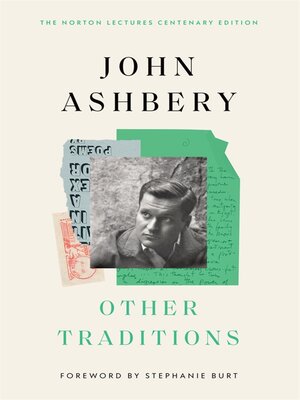
Sign up to save your library
With an OverDrive account, you can save your favorite libraries for at-a-glance information about availability. Find out more about OverDrive accounts.
Find this title in Libby, the library reading app by OverDrive.



Search for a digital library with this title
Title found at these libraries:
| Library Name | Distance |
|---|---|
| Loading... |
"An entertaining and shrewd little book ... Ashbery is an accomplished raconteur." —Charles Simic, New York Review of Books
The most influential American poet of his generation appraises the lesser-known writers who shaped his own confounding, infinitely inventive work.
John Ashbery was the quintessential "difficult poet." When asked to explain his work, he typically responded by insisting that his poetry was its own explanation. Fittingly, then, when he was invited to deliver the Norton Lectures at Harvard in 1989, Ashbery declined to spell out what he put on the page. Instead, he offered rapt audiences a tour of his influences, the authors he turned to as a "jumpstart for times when the batteries have run down."
The poets in Ashbery's personal canon—John Clare, Thomas Lovell Beddoes, Raymond Roussel, John Wheelwright, Laura Riding, and David Schubert—were all tragic figures in their own way, plagued by mental illness or poverty, ridiculed or barely recognized in their own lives, and in some cases, all but forgotten today. More importantly for Ashbery, each wrote poetry that somehow defies the reader. Clare's sometimes-monotonous naturalism, Roussel's exhausting maze of parenthetical clauses, and Wheelwright's eccentric Anglican mysticism do not invite casual reading. But under Ashbery's tutelage, we experience the idiosyncratic brilliance of these "other traditions," discovering how they shaped not only Ashbery's poetics but also the broader trajectory of twentieth-century literature, from surrealism to New Criticism.
With inimitable charm, wit, and erudition, the lectures collected in Other Traditions elevate the imperfect and peculiar, affirming the literary virtues of Ashbery's difficult predecessors. The result is a revealing self-portrait of one of the giants of American poetry, if only through a convex mirror.







